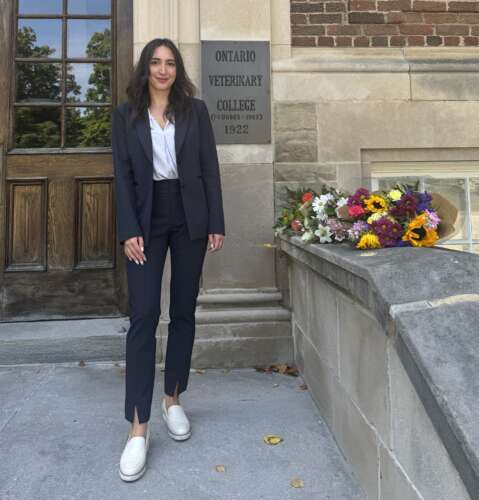From an undergraduate degree in biomedical science to a master of biomedical science and now a PhD in biomedical sciences in the area of reproductive health and biotechnology, Ola Davis knows what it means to be a University of Guelph graduate.
Now working as laboratory director in a Mississauga fertility clinic, Davis shares how her University of Guelph education prepared her for a career in assisted reproductive technology.
How did you come to choose the University of Guelph for your education?
I was always good at science in school and always enjoyed those kinds of classes – biology, chemistry, even math. So naturally, I was drawn to science for my undergrad, which was biomedical science.
I came to U of G, and I just loved the atmosphere. I really liked the size of the campus. It felt more inviting and accessible, and I really liked the biomedical science program.
In my fourth year, I took a reproductive biology course and learned about in vitro fertilization (IVF) and its uses in both human and animal reproduction and I was so fascinated. I didn’t even know the field existed or that careers existed in it.
How did the master of biomedical sciences program prepare you to work in assisted reproductive technology?

The master of biomedical sciences is a course-based, one-year program with an option of pursuing reproductive biotechnologies training and research.
We learned the theory of IVF and then experienced hands-on learning in the Department of Biomedical Sciences at the Ontario Veterinary College (OVC). There was also a hands-on research component guided by supervisors. It enabled me to learn certain techniques better than in a classroom.
We were doing bovine (cattle) IVF using bull sperm and cow eggs to perform IVF in the lab. We were able to conduct research on different aspects of eggs, sperm and/or the early embryos.
The reason we can do that – and what I think makes U of G really stand out – is this experiential learning aspect and having access to specimens locally (the lab partners with genetics company Semex and the Cargill facility in Guelph). It allows it to be a special program in the field.
From there I decided I wanted to be an embryologist in a human IVF clinic.
Why did you decide to pursue a PhD and remain at U of G?
After the MBS program, I worked as an embryologist for a few years. During this time, I realized that I wanted to take a bigger leadership role in the lab. I also recognized how much there still was to learn.
I felt that putting myself in that PhD environment would foster my learning at a better rate and allow me to become a better leader. I developed projects and new protocols, trained numerous undergrad and grad students, presented at conferences, and was involved in various graduate student committees.
I conducted research on endocrine disrupting compounds (chemicals that may mimic, block or interfere with the body’s hormones). We know that male sperm counts are decreasing worldwide and so I wanted to look at how environmental compounds might affect sperm quality and subsequent embryo development.
My communication improved as well as my understanding, comprehension and technical skills. During my PhD, I also spent time supporting the MBS program, doing guest lectures and lab demonstrations. It was important for me to give back in that way. I’m so interested in this field, and I love sharing what I’ve learned.
I also had a very supportive PhD supervisor, Dr. Laura Favetta, professor in the Department of Biomedical Sciences, who coordinates the MBS program. She allowed me autonomy, but also provided me with direction and support. I don’t think my success would be anywhere near what it has been without her.
Tell us about your current role in the field of assisted reproductive technologies
My expertise is in the IVF lab. I work as an embryologist – the person who combines the eggs and sperm and facilitates and observes their growth and development in the lab.
In my current role, a part of my job is also to ensure the lab is running smoothly. For us, it’s important to keep up with research, new equipment, new technologies, new procedures. It is a rapidly developing industry.
Two of my colleagues at the clinic where I work also took the MBS program at U of G and are embryologists.
Fall convocation ceremonies for OVC programs take place Tuesday, Oct. 15, 2024.
